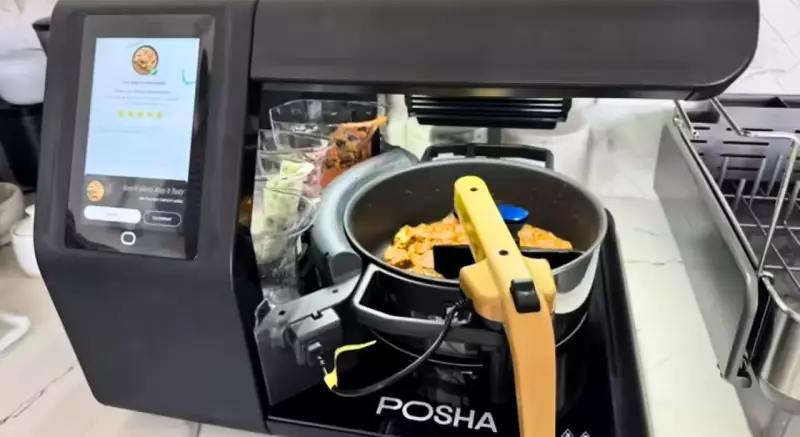
In today's fast-paced world where time seems increasingly scarce and responsibilities continue mounting, technology has emerged as the ultimate solution to simplify our daily lives. The latest wave of "lazy tech" innovations is specifically designed to minimize effort while maximizing convenience, transforming how Indian households approach everyday tasks.
Kitchen Revolution: Cooking and Beverage Gadgets
Posha Cooking Robot represents a significant leap in culinary technology. This advanced AI-powered kitchen assistant automates meal preparation completely, using an internal camera to precisely time ingredient additions. Users can customize spice levels, oil quantities, and water measurements through a dedicated mobile application. The device features automatic stirring, precise heat control, and real-time cooking stage detection. Priced at approximately $8,000 (around ₹6,60,000), Posha targets gourmet home chefs who seek automation without compromising food quality. While it delivers restaurant-grade meals and offers remote monitoring capabilities, the high cost and required subscription for full recipe access might deter budget-conscious consumers.
Neco Fufu brings a touch of whimsy to beverage cooling. This novelty device shaped like an adorable cat clips onto cup rims and uses a small integrated fan to cool hot drinks by mimicking human blowing action. Costing around $100 (approximately ₹8,300), it features an organic design that fits most standard cup rims. However, its practical cooling power remains limited, reducing temperature by only about 4°C after five minutes of operation. The device requires charging every hour, making it more suitable as an amusing gift than a serious cooling solution.
Ninja Swirl Ice Cream Machine enables homemade dessert creation with minimal effort. Priced between $150-$200 (roughly ₹12,500-₹16,600), this appliance transforms frozen ingredients into creamy soft-serve ice cream using rotating paddles that aerate mixtures effectively. It supports various treats including milkshakes and sorbets, though users must pre-freeze ingredients overnight and perform some cleanup afterward.
Home Maintenance Automation
EVAX W2 Omni redefines window cleaning through robotic technology. This $600 (approximately ₹50,000) device uses sophisticated suction cups and three specialized nozzles to spray and mop glass surfaces methodically. It reduces manual effort by roughly 80%, performing thorough cleaning on large glass areas without human intervention. The main limitations include its premium pricing and restriction to smooth window surfaces, requiring regular charging between uses.
AirDeer Lazy Trash Can introduces unprecedented automation to waste management. Costing around $400 (about ₹33,200), this smart trash can automatically seals full bags and replaces them with fresh liners using fan technology to pull liners into position. Its automatic lid opener and odor control features complement a battery life lasting up to six months, supporting 20 bags per refill. While the upfront cost is substantial, it offers remarkable hygiene benefits and time savings for busy households.
Grillbot 3.0 tackles the tedious task of grill cleaning. This $200-$250 (approximately ₹16,600-₹20,800) robotic cleaner uses motorized brush wheels to scrub grills automatically for preset durations. Users simply place it on the grill surface and activate the cleaning cycle. The mechanical simplicity ensures efficient cleaning, though the lack of sensors creates a risk of the device falling off edges, necessitating supervision during operation.
Personal Comfort and Organization
Couch Console with Gimbal Cup Holder revolutionizes living room organization. Priced between $150-$200 (roughly ₹12,500-₹16,600), this multifunctional console keeps remotes, phones, drinks, and essentials neatly organized. Its standout feature is a self-balancing gimbal cup holder that prevents spills even when the tray tilts or rotates. Additional inclusions comprise a phone holder and anti-slip mats, though the console's bulkiness might pose storage challenges when not in use.
Shirt Butler offers an innovative approach to garment care. This wearable robotic ironing system, marketed around $1,500 (approximately ₹1,24,500), uses inflatable balloons to stretch fabric while employing hot air to smooth wrinkles. It reimagines traditional ironing through automation but leaves some creases untouched and proves ineffective on heavily wrinkled clothing, making it unsuitable as a complete iron replacement.
Smart Duvet transforms bed-making into an automated process. This $1,400+ (over ₹1,16,000) device inflates an inner sheet to stretch and smooth blankets, achieving hotel-quality bed appearance effortlessly. Additional features include ambient lighting, built-in aromatherapy diffusion, and mild temperature regulation offering about 7°C difference. While the cost is significant, it brings smart home luxury to daily chores.
Chairless Chair 2.0 provides ergonomic support through exoskeleton technology. Priced at about $2,500 (roughly ₹2,07,500), this wearable device locks knees and hips to enable supported "sitting" anywhere without physical chairs. Weighing approximately 3kg, it offers innovative ergonomic support for workers requiring frequent rest breaks, though discomfort during extended use remains a concern.
Sole Glasses introduce hands-free reading through wearable technology. Costing nearly $800 (around ₹66,400), these glasses project text in front of eyes with AI-powered navigation that handles page turning and reading questions. While ideal for multitasking or users with mobility issues, the low 256x256 pixel resolution and limited visible text quantity might disappoint avid readers.
The Future of Convenience Technology
These lazy tech innovations demonstrate how artificial intelligence and robotics are progressively eliminating mundane tasks from daily routines. While premium pricing currently positions many devices as luxury items, their growing adoption in Indian households indicates a shifting paradigm toward automated living. As technology advances and production costs decrease, these convenience-focused gadgets will likely become more accessible, fundamentally changing how Indians manage household chores and personal tasks.
The integration of AI with everyday appliances represents more than mere convenience—it signifies a transformation in human interaction with technology. From cooking robots that learn dietary preferences to self-making beds that adjust to sleep patterns, these devices are paving the way for truly smart homes that anticipate and fulfill needs automatically. For Indian consumers increasingly valuing time efficiency, these innovations offer compelling solutions despite current cost barriers.






